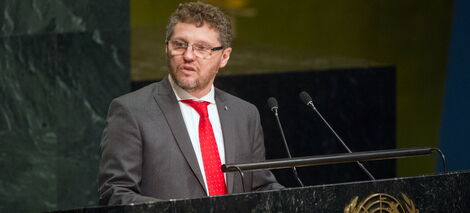-
Kenyans cheering during a past event TWITTER
-
A United Nations body has urged the United Kingdom to pay Kenyan communities that were forced out of their lands during the colonial era.
In a statement, the UN special rapporteur, Fabian Salvioli, made the new recommendations to the UN General Assembly this week, without specifying how much the communities should receive.
Salvioli had written to the British government expressing concern at the alleged lack of accountability and effective remedy for the victims of gross human rights violations.
The UNGA heard that the Kipsigi and Talai were forced off their land during the colonial period to make way for tea plantations. In addition, crimes against humanity were also committed.
 UN special rapporteur, Fabian Salvioli addressed the 71st General Assembly session in 2016. UN WEBSITE
UN special rapporteur, Fabian Salvioli addressed the 71st General Assembly session in 2016. UN WEBSITESurvivors have in the past detailed how entire communities were relocated from their homelands to create space for these tea plantations. A survivor stated that his entire tribe was relocated to a town named Gwasi on the arid shores of Lake Victoria after they resisted colonial rule.
More than 100,000 people signed a petition to the UN for loss of lives, injustice and incendiarism and also asked for an apology and reparations for the land they lost which is now owned by British and multinational tea corporations.
The UN rapporteur told the British government that reparations should include, “measures in the areas of restitution, compensation, rehabilitation."
As the matter rages on, the United Nations Human Rights Council (UNHRC) wrote to President Uhuru Kenyatta, in September 2021, asking his administration to share crucial information on the matter.
UNHRC sought to be informed whether the colonizer had offered any form of compensation or psychological and physical rehabilitation to the affected communities.
“Please indicate if financial support has been granted by the government of the UK, of Great Britain and Northern Ireland and/or the multinational tea companies to provide social, medical and educational services,” the letter read in part.
The letter also sought that the UN be informed if infrastructure and essential utilities to compensate for the victims’ suffering, as recommended by the National Land Commission (NLC), had been offered.
In 2013, the government paid reparations to victims of its bloody crackdown on the 1950s Mau Mau rebellion against colonial rule in Kenya. By , Kenyans.co.ke




